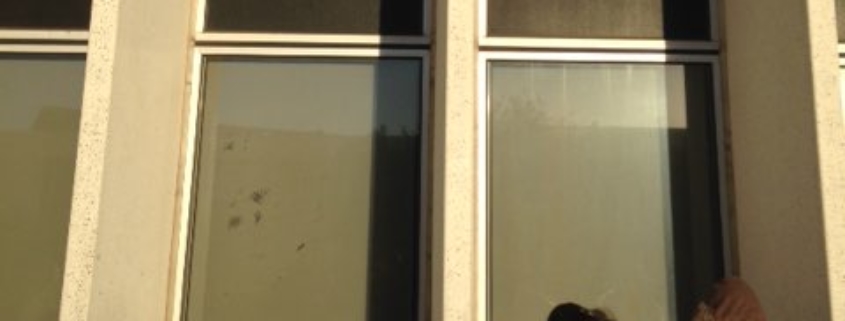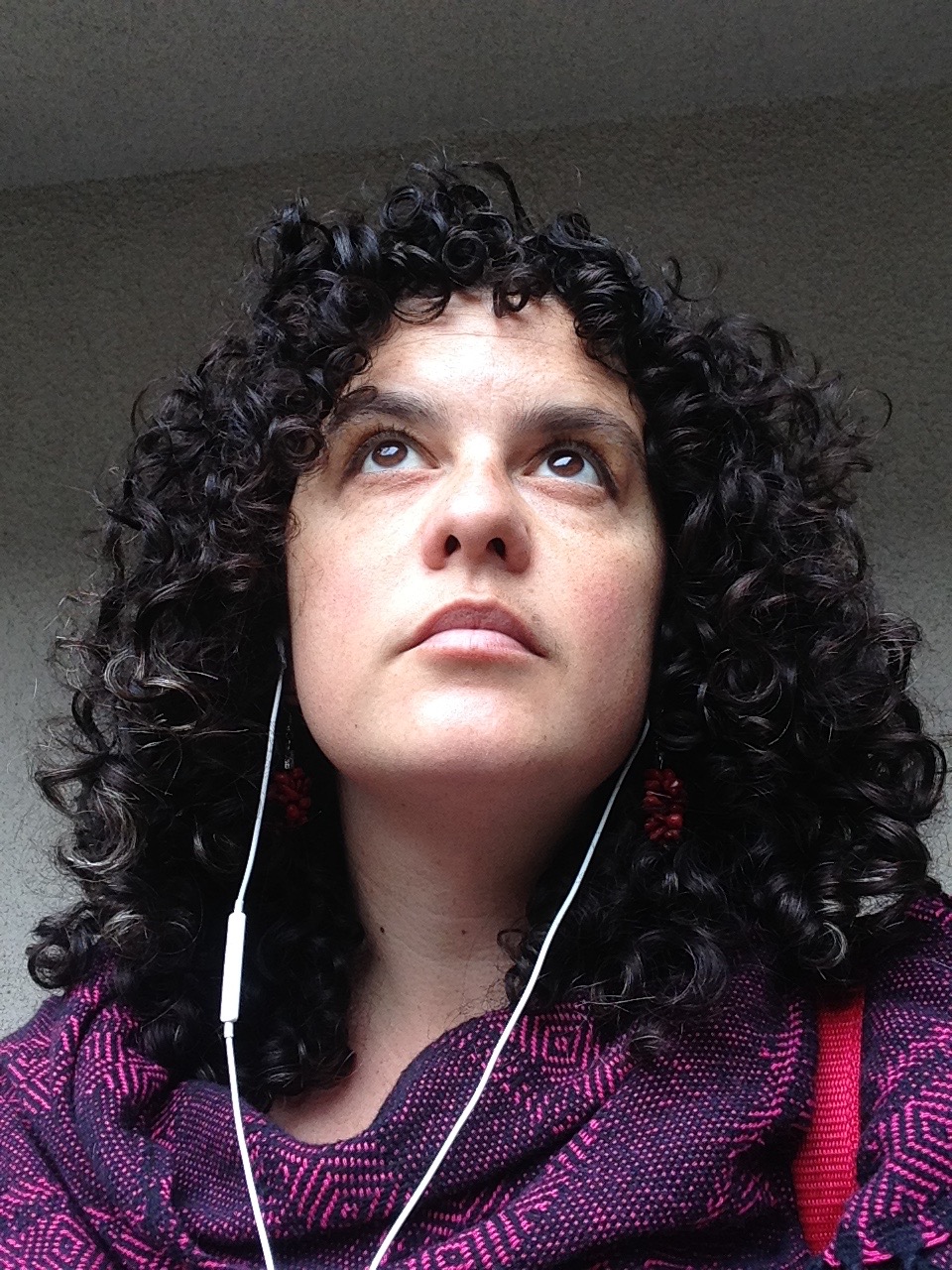Americans: Seeing Ourselves Through Growing Darkness
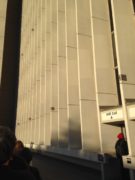 We all seemed small in the shadow cast by the Los Angeles Federal Building on Wilshire. The building, which is in an area known as Unincorporated Sawtelle—a parcel of land, surrounded by LA that is not part of LA County—is a white monolithic structure with columns that the eye follows from ground to sky. I arrived in the back courtyard at 7:15 on a Monday morning. At least a hundred people were already waiting, many wrapped in blankets or heavy winter coats. Families huddled to shield themselves from the cold in the sunless courtyard. We formed a line outside the entrance to the passport office, tucking our fingers inside our sleeves for warmth. I held tight to my paperwork, not wanting it to be swept up in the strong winds that whipped through the open space. A tall security guard, who worked for the passport agency, was checking to see that each person had an appointment. When he came to us, I explained my situation.
We all seemed small in the shadow cast by the Los Angeles Federal Building on Wilshire. The building, which is in an area known as Unincorporated Sawtelle—a parcel of land, surrounded by LA that is not part of LA County—is a white monolithic structure with columns that the eye follows from ground to sky. I arrived in the back courtyard at 7:15 on a Monday morning. At least a hundred people were already waiting, many wrapped in blankets or heavy winter coats. Families huddled to shield themselves from the cold in the sunless courtyard. We formed a line outside the entrance to the passport office, tucking our fingers inside our sleeves for warmth. I held tight to my paperwork, not wanting it to be swept up in the strong winds that whipped through the open space. A tall security guard, who worked for the passport agency, was checking to see that each person had an appointment. When he came to us, I explained my situation.
I had been in LA for 12 days for my MFA residency at Antioch University Los Angeles, the entire time waiting for my passport to arrive in the mail. It arrived on the tenth day, a Saturday, at 4:30 p.m. I was relieved, as my flight to México was on Monday morning. The priority envelope was torn and re-taped with black markings, which I assumed was related to its lateness. It was supposed to have arrived on Tuesday. Opening the envelope, I pulled out a plastic bag with text that read “We Care” and expressed regret for the damage to my item and hopes that this would not be an inconvenience. Inside the bag I saw a mess of blue. I did not pull out a passport, but a collection of pages in various states of ruin held together by a warped blue cover. I pulled out tattered images—an eagle with a mountain behind him, another eagle with a tall stalk of wheat, a flag engorged by wind, the Statue of Liberty. My photo page was intact, but detached from the rest of the booklet. I could not travel with this.
The security guard at the Federal Building asked a question that I would hear all day from different passport agency workers. “They sent it to you like that?” I confirmed, “Yes, just like this.” He sent me across the courtyard, where another line formed at ground floor. In between the ominous concrete white fins that rose to the very top of the Federal Building were dark pockets and a ledge where more people huddled, filling out paperwork. The tall columns caught the sun and glowed golden, but all else stood in shadow cast by the building. Two of these pockets had signs that read Will Call A and Will Call B. I joined the line there.
* * *
On that same morning, electors we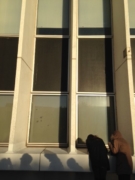 re gathering to cast their electoral votes for Donald Trump or Hillary Clinton. The dim future of a Trump presidency had begun to reveal itself and although I was holding out hope that the electors would stage a resistance, I did not believe that it would be enough to turn the tide. My broken passport was a bag of American tropes and symbols, an obvious metaphor for my confusion about being American. This identity is supposed make me feel or act with a certain sense of pride, but what I often feel is confusion. These symbols somehow represent who I am, who we are. Seeing them strewn out on the table that Saturday, I felt only the rising tide of conflict in my chest. Is the conflict and confusion I feel in my body an identity? Part of what it means to be American?
re gathering to cast their electoral votes for Donald Trump or Hillary Clinton. The dim future of a Trump presidency had begun to reveal itself and although I was holding out hope that the electors would stage a resistance, I did not believe that it would be enough to turn the tide. My broken passport was a bag of American tropes and symbols, an obvious metaphor for my confusion about being American. This identity is supposed make me feel or act with a certain sense of pride, but what I often feel is confusion. These symbols somehow represent who I am, who we are. Seeing them strewn out on the table that Saturday, I felt only the rising tide of conflict in my chest. Is the conflict and confusion I feel in my body an identity? Part of what it means to be American?
Although I have never been in the military, they allowed me to enter the passport agency on the veterans’ line, which meant that I entered rapidly, but once inside, I waited the same as everyone else, first for a number and then for the number to be called—in total about an hour and a half. People in need of papers settled into their seats, whole families, single individuals, representing several countries and many different faces of America as well as varying class backgrounds. (I suspect the super-rich must have a way to avoid this waiting game.) A girl entered wearing gold rimmed glasses, tinted dusty rose. She scowled at the full waiting room, found a seat and took out her phone. She kept the sunglasses on the entire time. I wondered if the scene looked better behind that warm blush. Everyone present needed a passport fast. That was what we had in common. And we were all U.S. citizens.
Being a white middle class American has meant knowing that I have privileges that folks all over the world (including within our borders) do not have, knowing that my privileges are directly correlated to the lack of privilege that pervades the lives of most human beings. This has meant never feeling “pride” in my country, because while my country (and the idea of my country) protects me, it does not protect (in fact, it harms) so many others. I have never known how to live with this.
My parents are Italian American raised in New York City, which now having lived in another city, I realize is unlike the rest of the country. I never saw rural poverty, but knew kids who looked different and practiced different religions. Many of our families came by way of Ellis Island, passing Lady Liberty, who stands proudly in the blue passport booklet.
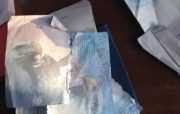 My passport reads like an advertisement for Westward Expansion, the imagery tells a history of movement across the continent: the billowing sails of an explorer’s mighty ship, rivers carrying goods inland, the Liberty Bell in mid swing, buffalo, cowboys, cacti, an eagle. Migrating birds soar across the fibrous pages, along with a bear eating a salmon, heroic looking corn, even a totem pole (an ugly ironic gesture toward inclusion that actually points at a genocide). The images express a belief that it is not only our “right,” but God’s will that we expand West. They intend to show me my birthright—the place we call America, which is actually just part of the North American continent. Like the continents drifting apart, these images drifted out of their passport binding, their supposed meaning losing substance, becoming a hypocrisy.
My passport reads like an advertisement for Westward Expansion, the imagery tells a history of movement across the continent: the billowing sails of an explorer’s mighty ship, rivers carrying goods inland, the Liberty Bell in mid swing, buffalo, cowboys, cacti, an eagle. Migrating birds soar across the fibrous pages, along with a bear eating a salmon, heroic looking corn, even a totem pole (an ugly ironic gesture toward inclusion that actually points at a genocide). The images express a belief that it is not only our “right,” but God’s will that we expand West. They intend to show me my birthright—the place we call America, which is actually just part of the North American continent. Like the continents drifting apart, these images drifted out of their passport binding, their supposed meaning losing substance, becoming a hypocrisy.
Where do we fit in this? Who is the we? It is no secret that the American identity is fraught with too many meanings. As our best self, we offer a place for the “huddled masses.” At worst, we carry out and sanction murder and nurture a belief that we are superior, which seeps into the bones of Americans and creates desirous attachment to wealth. This country scares me and this country fascinates me. But I do not believe in it. It is not a religion.
* * *
The manager at the passport agency promised to try to rush the creation of my passport, but by 11am it was still not ready and, knowing I would miss my flight, I left Unincorporated Sawtelle for Los Feliz to eat burritos and browse the oddities at Soap Plant Wacko, a store that sells items like robot lunchboxes and taxidermied raccoon feet and was exhibiting a series of Barbie Dolls in reenactments of biblical scenes. Somewhere inside the pillars of the Wilshire Federal Building, they were creating the blue booklets that would grant us permission to move freely through most of the world. They were binding, taping and quality checking, so I could exercise my right to come and go.
I returned to the courtyard passport agency later that afternoon and joined the end of a very long line at the Will Call windows. The sun had retreated behind the building and everyone in the line held their bodies up against a beating cold wind that made the flagpoles clank continuously. The woman in the rose sunglasses pulled a cowl neck sweater over her face and spoke through it. “Watch me get sick right when I go on vacation. I swear it took me an hour to warm up after standing out here this morning.” A man’s wife brought him a Santa hat to keep warm and then retreated back to the car with her baby. If we had known one another, we might have formed a huddling mass to keep warm.
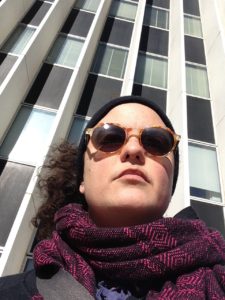 We were there to take advantage of our right to move freely, by retrieving our passports, the ultimate form of identification and proof that we belong here in The United States. We had jumped through the hoops and proven ourselves worthy. By the time I got my passport, we knew that the electors had chosen Donald Trump to be our next president. Now his presidency is almost upon us, and the part of the population that has the ability to move freely will become narrower as this new president attempts to change what it means to belong. Some of us will be deported, some might need to register; we have heard talk of internment and have seen blatant disrespect for the rights of activists. We have seen that the victims will be blamed. I continue to use the “we” because the “we” will be necessary.
We were there to take advantage of our right to move freely, by retrieving our passports, the ultimate form of identification and proof that we belong here in The United States. We had jumped through the hoops and proven ourselves worthy. By the time I got my passport, we knew that the electors had chosen Donald Trump to be our next president. Now his presidency is almost upon us, and the part of the population that has the ability to move freely will become narrower as this new president attempts to change what it means to belong. Some of us will be deported, some might need to register; we have heard talk of internment and have seen blatant disrespect for the rights of activists. We have seen that the victims will be blamed. I continue to use the “we” because the “we” will be necessary.
We will need to keep each other warm, to belong to one another. We will need to fight for the rights of others. In doing so, we will stay warm, stay protected. The shadows grow wider, we reach our fingertips out to the sides, trying to catch the sunlight, trying to see ourselves.
Meredith Arena is from New York City and resides in Seattle where she works as a teaching artist in the public schools and facilitates meditation for adults. She is a student in the MFA program at Antioch University Los Angeles. She is a Creative Non Fiction Editor on Lunch Ticket. Her work has appeared in Entropy, Lunch Ticket and SHIFT Queer Literary Arts Journal.

